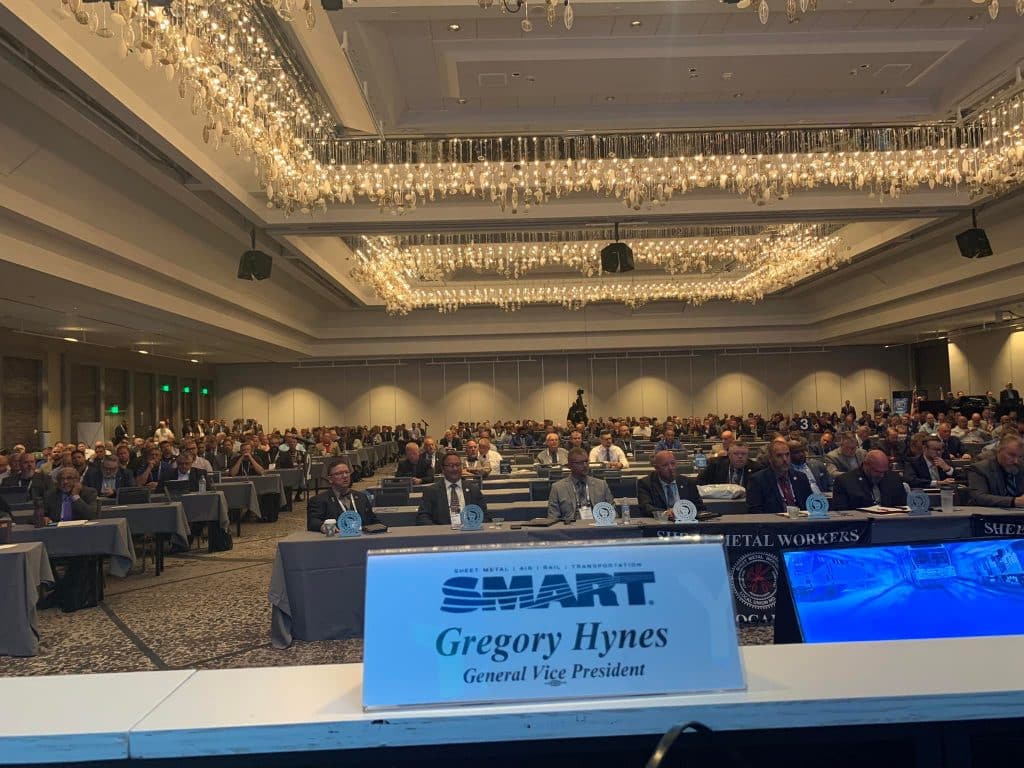
SMART General President Joseph Sellers opened the inaugural SMART Leadership Conference on Monday, with local leaders from sheet metal and transportation gathering in San Francisco for four days of hard work on behalf of SMART members across North America. The theme, “Growth Through Unity,” encompassed the focus of the day: in the joint session, sheet metal and Transportation Division sessions, and breakouts, SMART leadership focused on how to secure the future of our union – together.
Leaders emphasize unity in joint session
In his opening remarks, General President Sellers summarized the many events of the last several years for attendees, noting that political developments in both the United States and Canada have created unprecedented opportunity for our union – as well as the labor movement at large.
He began by recounting some of the legislative victories achieved for SMART members across North America: huge investments in the union transportation and sheet metal industries in the Bipartisan Infrastructure Law, pension protection in the American Rescue Plan, project labor agreements on federal projects above $35 million in the United States; and the achievement of the Labour Mobility Tax Credit and real apprenticeship funding for SMART brothers and sisters in Canada. He also noted the recently proposed rule for two-person crews and the importance of working together, across sheet metal and transportation, to secure that victory for SMART rail workers.
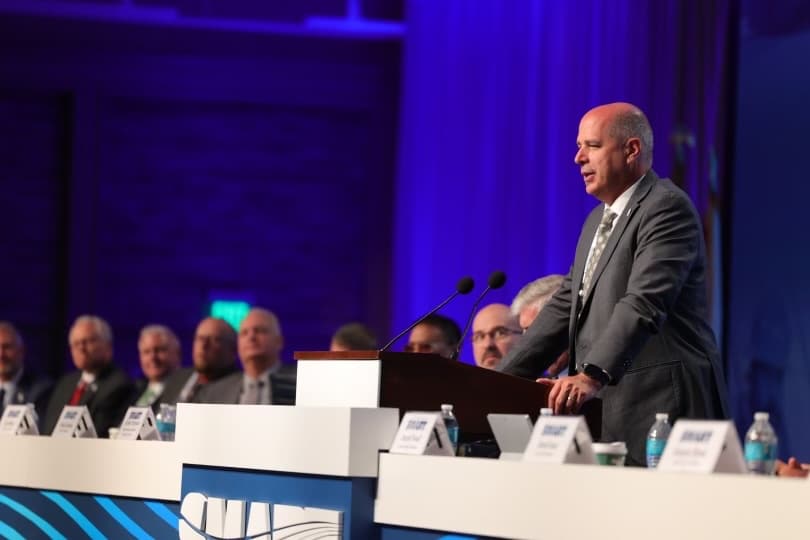
“We must be proactive and seize our opportunities to strengthen and grow our union,” Sellers said. “We must build our capacity and capitalize on union-friendly administrations in both the U.S. and Canada.”
That being said, he pointed out, all those gains will be in danger if anti-labor politicians take back Congress. Elections in battleground states don’t only matter for locals in those states – they will impact the future of our entire union.
“Either we determine the future of our union, or our adversaries will do it for us,” Sellers declared. “So let’s organize, mobilize, recruit and fight like hell to increase our density and our market share across industries.”
General Secretary-Treasurer Joseph Powell elaborated on General President Sellers’ speech, noting the need to accelerate our union’s growth while touching on the battles facing the Transportation Division and the ways SMART has used technology to expand member services without increasing expenses. The general secretary-treasurer pointed out that, given the growth in construction jobs, sheet metal locals need to increase their organizing, recruitment and retention.
“We have learned at this point that we can’t predict the future,” he said. “But two things we know for certain. One is that there is an enormous amount of opportunity ahead. The other is that we will need to work hard to make the most of that opportunity. Together, we will do just that.”
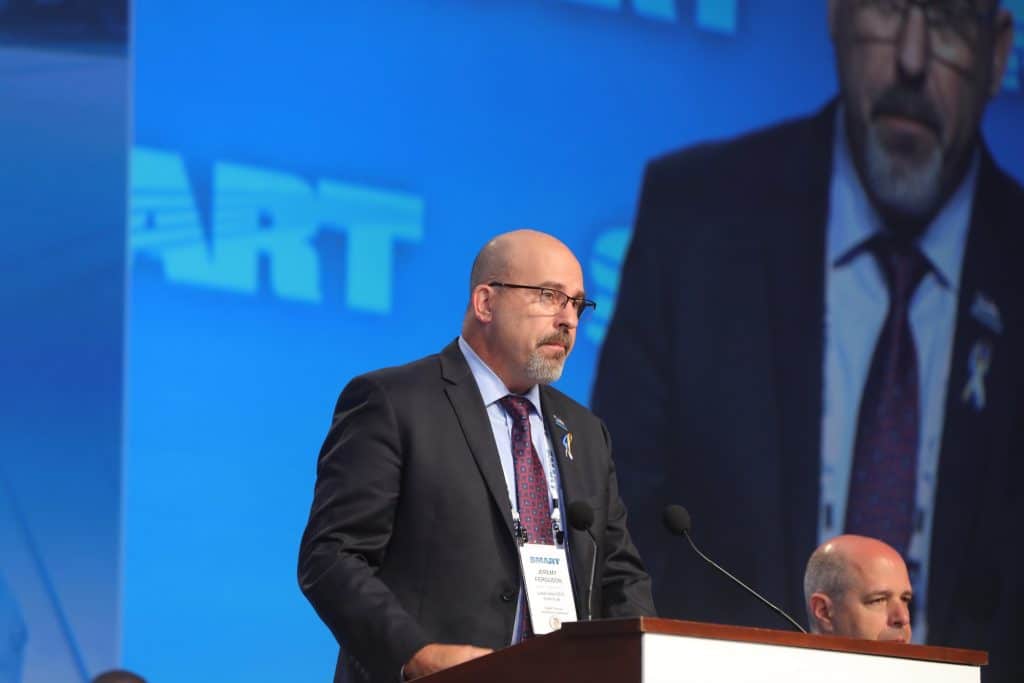
Jeremy Ferguson, president of the SMART Transportation Division, used his opening remarks to reflect on the massive efforts to bring SMART together in the past – particularly the 2019 General Convention – and vowed to work tirelessly across sheet metal and transportation to make our union stronger than ever. Ferguson also spoke on the furious fight to safeguard and expand working conditions for Transportation Division members against corporate onslaught, particularly the Class 1 freight railroads.
“When things get tough, I know that the one thing we’re not afraid to do in the face of adversity is to show up and step up,” he said. “We’re not fearful of the challenges that we see ahead, after what we’ve been through.”
Ferguson touched on the ways the Transportation Division has dedicated itself to better serving members, from an app that allows workers to report safety violations, to the rolling out of SMART University, to the improvement of the Transportation Newspaper – including a column written by Ferguson titled “What your union is doing for you.” All of these initiatives, he explained, are part of the Transportation Division’s effort to strengthen, to unify, to come together and meet the needs of the membership as a whole.
Through all the difficulties of the last several years, a bright spot has emerged: friendly figures in government and federal agencies. Ferguson noted that, thanks to relationships with FRA Administrator Amit Bose, Secretary of Transportation Pete Buttigieg and others, SMART members have a voice in the halls of power. And most importantly, he declared, the unity and solidarity of SMART provides a road map to a better future for all members.
“The changes we made in 2020 that we were all a part of have opened the doors to lasting progress for our organization and hope, even as we fight through all that the carriers and their Wall Street oligarchs throw at us to grind us down, such as draconian attendance policies,” Ferguson said.
Also speaking during Monday’s joint session were SMART TD California State Legislative Director (SLD) Louie Costa and SMART SM Local 104 (San Francisco) Business Manager Rick Werner. In each of their speeches, Costa and Werner touched on the histories of union transportation and sheet metal in California: the challenges, the battles fought and won, the ongoing struggles and the great potential for growth across all SMART crafts. Notably, both Costa and Werner recounted specific instances where unity – between different locals, and between sheet metal and transportation industries – helped spur the success of SMART.
“It is only together, as one, in all crafts, that we can, and will, solidify the theme of this year’s conference: ‘Growth Through Unity,’” Costa said.
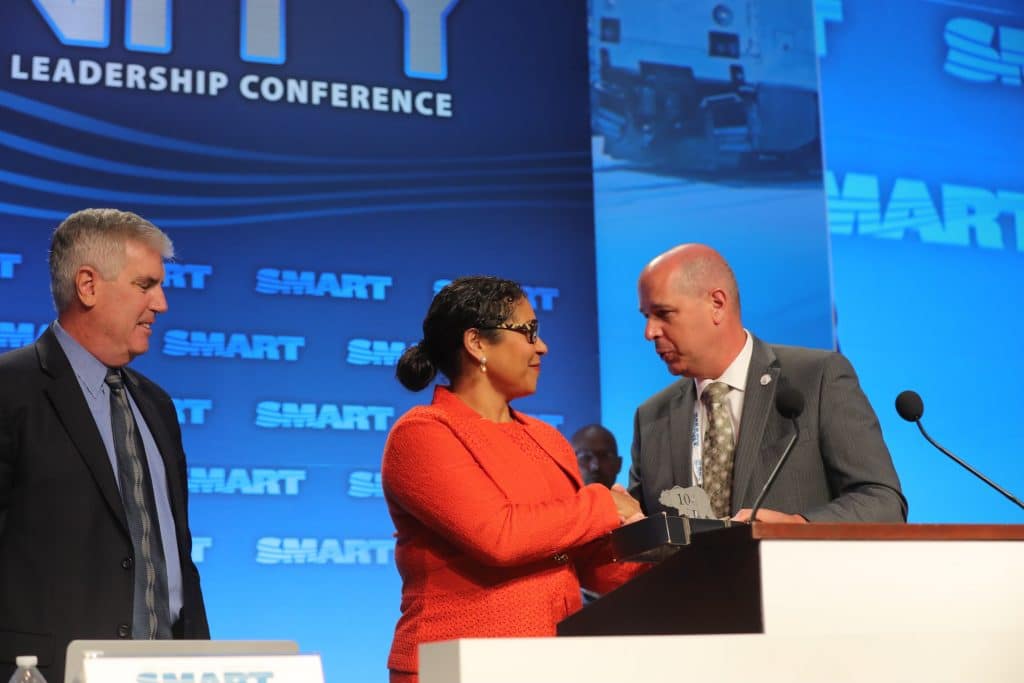
To cap off Monday’s joint session, the SMART Leadership Conference welcomed San Francisco Mayor London Breed and United States Surface Transportation Board (STB) Chair Marty Oberman – both figures who have showed themselves to be allies of working people and SMART. In her speech, Mayor Breed recapped the efforts of the San Francisco government, under her leadership, to bolster the rights of organized labor, including raises for union city employees and the CityBuild program – a pipeline for people from underserved communities to enter the unionized construction trades. She also addressed the city-wide project labor agreement signed into law in 2019.
“Having a strong PLA is important to ensure not only that we get these projects done, but the men and the women who work to push these projects through are supported through good living wages,” Breed said. “I know that’s what you all represent.”
Oberman, meanwhile, discussed the STB’s efforts to investigate the decline of freight rail service in the United States. Pointing to the reckless workforce slashing that has helped spur current freight rail disruptions, Oberman noted that much of the railroads’ difficulties hiring the workers needed to keep America’s supply chain running resulted from current working conditions – no business, he added, could function on the back of a nearly 30% workforce cut.
“It’s quite clear that the main force driving how the railroads are being managed these days are the pressures of stockholders,” he said.
Following Oberman’s speech, General President Sellers closed the joint session – but the day’s work had only begun, as sheet metal and Transportation Division leaders separated for industry-specific breakout sessions. Read more here.
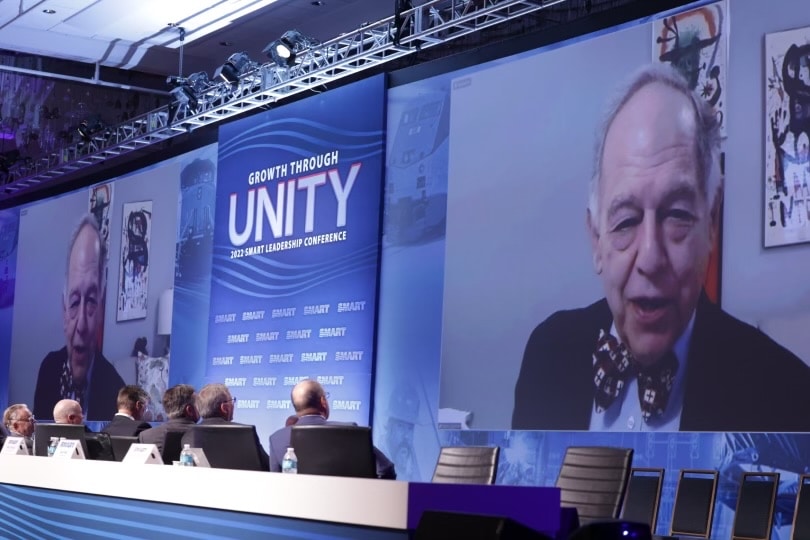
Related News
- Fourth of July 2025: General President Coleman’s message to members
- Senate Strikes Down Spending Bill’s Harmful AI Provision
- Razor blade found on brake wheel
- Coming Soon: SMART-TD Voluntary Income & Life Protection (VILP) Program
- NIH funding cuts contribute to lost work hours for San Diego sheet metal workers
- Senate Passes Tax Bill Without Including Railroaders
- Canada Day 2025: General President Coleman’s message to members
- SMART-TD Honors the Retirement of Brother Greg Hynes: A Visionary, a Fighter, and a Legend
- SMART-TD Calls on U.S. Senate to Support the Cantwell Amendment and Protect Rail Workers
- Yardmaster Protection Act Introduced